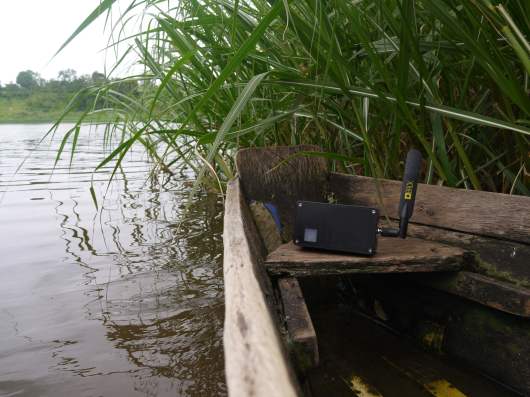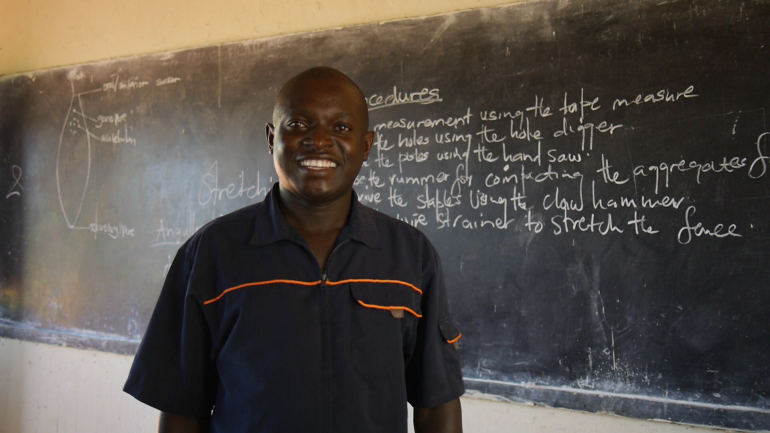BRCK+ED Expedition: Part Two
The BRCK team is back in Nairobi! We’ve just spent six days testing BRCKs in the wild and learning from those who use our products to solve problems they face everyday. We’ve been a bit remiss in providing regular updates as we go. It turns out Jinja, Uganda, is an exciting place, and we were running from sunup ‘til sundown to fit everything in, leaving little time for blogging. We’ve now got hours of footage and records of conversations to go through, and we’ll be filling you in over the next week or two.

Our last update concerned a school on Lingira island in Lake Victoria. Despite having only a small village on the island, the school’s 12 teachers serve over 250 students from neighboring islands, too.
One of the head teachers, Frederick, showed us around – his passion for chemistry was apparent in the way he described the school’s water filtration system (using electrolytic chlorination to disinfect the water) and the solar power system that runs it. He was extremely gracious in sharing his hopes for delivering more practical, hands-on content from the web (he has his physics students building rheostats from scratch, determined to help them build an understanding of technology, even if it’s not readily available locally).
We tested a number of different types of antennas on Lingira and got the school connected. With the help of Hackers for Charity, over the next few weeks the “Living Hope” Secondary School will be building new content from the web into their curriculum, and inspiring their students to ever greater heights of achievement.
Context is Everything
We’ve been working with educators and content providers here in Kenya over the last six months to understand how technology can make their lives easier instead of harder. Why would we need to go all the way to Uganda to do the same, some might ask? Despite being only a 15-hour drive apart, (give or take a couple hours at the border) Jinja and Nairobi offer very different contexts for deploying edtech solutions.
 Much of Kenya is very dry, with dust and heat being a major concern for electronics, both things the BRCK is designed to handle. In Uganda, with an average annual rainfall of over 150cm in the highlands (compared to Kenya’s average of 100cm, mostly concentrated near the border), water and humidity are greater concerns. The BRCK performed admirably in these conditions, with no noticeable moisture buildup in the case despite 30°C heat, 96% humidity, boat spray, and even being dropped in the floor of the raft.
Much of Kenya is very dry, with dust and heat being a major concern for electronics, both things the BRCK is designed to handle. In Uganda, with an average annual rainfall of over 150cm in the highlands (compared to Kenya’s average of 100cm, mostly concentrated near the border), water and humidity are greater concerns. The BRCK performed admirably in these conditions, with no noticeable moisture buildup in the case despite 30°C heat, 96% humidity, boat spray, and even being dropped in the floor of the raft.
(Note – the BRCK is NOT waterproof. Do NOT submerge your BRCK, leave it out in the rain, or expose it to overly wet conditions for long periods of time.)
In addition to different environmental conditions, the teachers we met in Uganda have unique goals and face different constraints. Not being educators ourselves, we built the BRCK as a platform for delivering any kind of content. While our partners at eLimu are working to deliver a custom package that conforms to the Kenyan curriculum via tablets, and Sugata Mitra’s “School in the Cloud” TED prize wish is seeking to provide access to the entirety of the web, Johnny at Hackers for Charity introduced us to Luom and David from Karamoja.org, working in northern Uganda near the border with South Sudan. Because even a 3G connection is difficult to achieve where they work, they are interested in blending online and offline content through the RACHEL platform that delivers offline versions of Wikipedia, Khan Academy, and other content packages.
 We didn’t originally think of the BRCK as an offline solution, but the Karamoja.org team are excited enough about the ability to store content on the BRCK and periodically sync it with updates via WiFi from a drone or regular visits from staff to areas with a stronger signal, they made the 10-hour journey from Karamoja to Jinja to tell us what they want the BRCK to do. It was deeply humbling to see their dedication to bringing the same opportunities for learning to the children of rural Uganda that much of the rest of the world take for granted, and it’s these sorts of innovative ideas – that come from locals with years of experience working in their own communities – that drive us to design in Africa, for Africa, and to get the engineering and design team out of the office as much as possible.
We didn’t originally think of the BRCK as an offline solution, but the Karamoja.org team are excited enough about the ability to store content on the BRCK and periodically sync it with updates via WiFi from a drone or regular visits from staff to areas with a stronger signal, they made the 10-hour journey from Karamoja to Jinja to tell us what they want the BRCK to do. It was deeply humbling to see their dedication to bringing the same opportunities for learning to the children of rural Uganda that much of the rest of the world take for granted, and it’s these sorts of innovative ideas – that come from locals with years of experience working in their own communities – that drive us to design in Africa, for Africa, and to get the engineering and design team out of the office as much as possible.
Teachers Just Want to Teach
One of the primary reasons Johnny Long founded Hackers for Charity was the realization that technology offered boundless opportunities for learning, but only if teachers know how to use it. The schools in Uganda tend not to have IT departments, so he rallied the hacker community to provide their skill sets to help teachers focus on teaching, and leave the tech to the geeks. He now has a global volunteer network of programmers and hackers working to make technology simpler and easier to use.
One of the educators he introduced us to, Lisa Coggin – who helps run a number of schools north of Jinja – emphasized the need for a push-button solution to online content delivery. Teachers don’t have the time to sort out IP addresses and subnet masks, and even terms such as “dashboard” are not automatically intuitive to those working outside the tech sector. We’ve been pushing hard at BRCK to redesign the way people connect to the internet, and Lisa’s feedback on her experience with the BRCK was invaluable in steering us towards ways to further simplify our interface.
Partners in Connectivity
Ultimately, our trip to Jinja was a resounding success. Our hosts at Hackers for Charity were phenomenally generous, and we can’t thank those who took the time to share their experiences, thoughts, and hopes with us enough. We also took some time to have fun testing a couple other uses of the BRCK involving sensors and remotely operated vehicles, which we’ll get into in our next posts, but more than anything, we’re thrilled to see how excited everyone we met is about the BRCK, and to see the promise of BRCK+ED making a real difference in the future of learning in Africa.


Sounds amazing, would love to help test in the schools we work with in rural Tanzania..